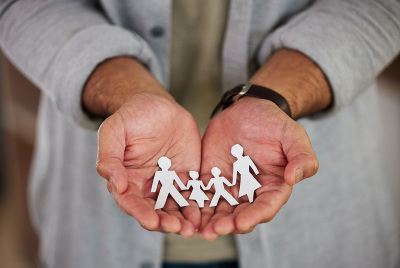
This article was originally published on Christian Post - Opinion. You can read the original article HERE

More than 2.5 million children in the U.S. are currently in the care of relatives — or “kinship care,” as it’s called. This statistic represents tens of thousands of grandparents, siblings, aunts, uncles, cousins and other extended family members who have stepped up in a time of need.
It’s not always easy, but kinship care is crucial. Research shows that this form of care has better outcomes for children and families when parents aren’t able to safely care for their children. And, this month — National Kinship Awareness Month — honors those caregiving for the children in their lives, and it also gives all of us a chance to uplift the caregivers in our communities.
Kinship care is much more common than one might think, despite often being under-supported within the child welfare system. One in 11 children lives in kinship care for at least some time during their childhood. Reunification with their parents, when safe and appropriate, is always the goal for kids who are removed from their parents’ care. But no matter the outcome, children belong in families, and kinship care helps maintain familiar bonds with families and culture and minimizes the disruption to a child’s life.
Two grandparents got the call that their toddler granddaughter needed to be placed with family — more precisely, with them. They didn’t hesitate to say yes. And for over two years, their granddaughter lived with them before being successfully reunited with her mother. She’s still with her mom today.
It’s hard to understate just how critical their kinship caregiving was in helping produce a happy, healthy family outcome. Letting this precious little girl stay with people she knew, in a community where she already had connections, helped make sure she could thrive in those years, not just survive them.
And research thoroughly backs this up. Studies show that placing children in foster care in a kinship setting is beneficial for children and families when kids can’t safely stay with their biological parents. Children who are placed with kin experience less trauma than they may otherwise face if placed with non-relatives.
Research shows further that children who are placed with kin have an easier time adjusting to new situations and experience less behavioral problems. Kinship care also helps keep siblings together: A 2013 study in Illinois showed that sibling sets are much more likely to stay together when placed with kin, even for children with three or more siblings.
It is also often a profound and transformative experience for family members who step into the role of primary caregivers.
Kinship caregivers need a lot of help, too — and, thankfully, that help comes in many forms. Programs like Bethany Christian Services’ Say YES to Family help identify kin to care for children in need and prepare them to care for children. This program also provides support to kinship caregivers when the children are in their home.
But for those programs to really do their work effectively, they need vibrant, enthusiastic communities full of men and women willing to lend their time, talents and resources to the support of vulnerable children and their families.
A family that’s transitioning to kinship care may experience a wide range of challenges and changes as they learn to support a child who’s being placed with them. They need support from their friends, church, community and the child welfare system.
They might need help with transportation, childcare, bills or other logistics. They might need the name of a good local doctor, or an invitation to the park. They might just need someone to take the time to listen.
In other words, they need support from all of us. And from you.
So take the next step, even if it’s the first one you’ve taken. You probably already know a family who’s stepped up to help support a child as a kinship caregiver — or maybe you know someone who will experience this soon. Lean in at church, in your neighborhood, at your school. Seek out child welfare organizations that can connect you with programs or people who can use your help.
Do a little, today and everyday. It might help change a child and a family’s whole world.
Kristin Meyer is vice president of quality improvement and innovation at Bethany Christian Services.
This article was originally published by Christian Post - Opinion. We only curate news from sources that align with the core values of our intended conservative audience. If you like the news you read here we encourage you to utilize the original sources for even more great news and opinions you can trust!











Comments